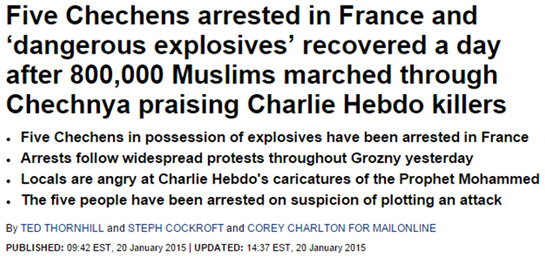The arrest in France of Chechens is being used to stoke up hatred of Russia, and showcase the hypocrisy of the West on terrorism.
Five “Russians” were arrested in France earlier this week, and the ensuing media frenzy – however brief – over the event sought to implicate Russia in the French terror crisis that has followed the January 7 attack on Charlie Hebdo. Taking their cue from wire services, multiple English language newspapers mentioned the five Chechens – arrested in Beziers and near Montpellier, on France’s southern coast – as “Russians” and sought to link them to a rally in the Chechen capital alleged to have “praised the killers” of the Paris cartoonists.
After citing a statement by the French prosecutor that the arrests were most likely a matter of organized crime, rather than terrorism, the media proceeded to ignore it – and spin a yarn about “Russian Chechens” somehow menacing the West, no doubt aided by that “mastermind of evil”, Vladimir Putin.
The BBC, for example, led with the arrests on the Riviera, but filled the rest of the story with coverage of the January 7-9 attacks on Charlie Hebdo and a Paris kosher store. In a typical display of guilt-by-association, Britain’s Daily Mail sought to link the arrests with a mass rally in Grozny the day prior, where “Muslims marched… praising Charlie Hebdo killers” (sic).

There was, indeed, a rally in Grozny on Monday, drawing close to a million people. But while they protested the “freedom of speech” that somehow consisted only of offending traditional believers for offense’s sake, the gathered Chechens also unequivocally condemned terrorism – a fact that the Western media somehow managed to miss. The crowd also gave a thunderous ovation to Bishop Varlaam of the Russian Orthodox Church, who denounced the wantonly offensive cartoons as hateful and divisive.
Present-day Chechnya is a gaping hole in the mainstream Western narrative of the “war on terror.” During the “democratic” 1990s US activists and officials often wax nostalgic about, the Chechen Republic of the Russian Federation was in the grip of a cruel Islamist insurgency. Early attempts to defeat them by force failed, so Moscow gave them the autonomy they claimed to have wanted, and hoped for peace. Instead, egged on by their Western supporters – influential US policymakers among them – the Chechen separatists launched terror attacks throughout Russia: apartment bloc bombings, train and airport bombings, and two hostage sieges, the worst being the September 2004 attack on an elementary school in Beslan, where almost 200 children were killed.
But while Russia condemned the September 2001 attacks in New York and Washington and offered the US help in fighting terrorism, the West refused to sympathize with the victims of Chechen terrorism – choosing instead to blame “Putin’s oppression” and even claim the attacks were “KGB false flags” Chechen terrorist leaders found sanctuary in the West: Ahmed Zakaev, the self-styled “Prime Minister of the Chechen Republic of Ichkeria,” received asylum in the UK. Within hours of the Charlie Hebdo attack, Zakaev was writing the French government accusing Russia of being behind the terror.
In the aftermath of 9/11, the US invaded and occupied Afghanistan, claiming it was giving sanctuary to terrorist leader Osama bin Laden; almost a decade later, US Special Forces reportedly found and killed bin Laden – in Pakistan. Meanwhile, Washington also launched an invasion of Iraq in 2003, using the manufactured threat of “weapons of mass destruction.” The war and the subsequent occupation claimed hundreds of thousands of lives, and the country torn apart by sectarian violence has largely fallen prey to “Islamic State” forces – themselves a product of the Washington-backed rebellion in neighboring Syria.
Meanwhile, the supposedly “repressive” Russia patiently and determinedly crushed the Islamist terror movement in Chechnya – and promptly handed the republic back to the Chechens. Grozny and other cities were rebuilt, order was restored, and under the leadership of current president Ramzan Kadyrov, the Chechens are fiercely loyal Russian patriots – and proud Muslims as well. All that happened in the course of the same decade as the American fiasco in Iraq, but without any “nation-building” or “democracy activism.” These days, when broken remnants of the Islamists try staging attacks – as they did in Grozny in early December 2014 – they are swiftly handled by Chechen law enforcement.
However, due to the media narrative insisting that Russia must be evil, the Western press has ignored the Chechen example of handling terrorism. Worse yet, Western governments have turned a blind eye to Chechen militants they’ve embraced as “freedom fighters” – so long as their target was Russia – and even brought over as asylum seekers. The deadliest example of such ignorance was the April 2013 bombing of the Boston marathon, blamed on two Chechen brothers who grew up in America.
There are other cases of Washington and its European allies embracing militant Islamists to further their political agendas – Libya and Syria most recently, the Balkans in the 1990s, etc. – while claiming to be fighting them in places like Afghanistan, Iraq or Yemen. This brings to mind the perverted logic once embraced by totalitarian ideologues, who showed their contempt for Christian civilization by declaring that morals were relative, and the only measure of good and evil was in who was doing what to whom. So “our” people can do no wrong, while the “other” can do no right.
Internalizing this belief explains why, while a million Frenchmen marched in solidarity with a magazine that continued to offend them while they did so, nobody lit a candle for the hundreds of truly innocent victims of Boko Haram in Nigeria. Or, for that matter, why there was little mention, let alone solidarity, in the West for the schoolchildren murdered in Beslan in 2004. They were only “evil Russians”, after all.
This originally appeared on Russia Today.





